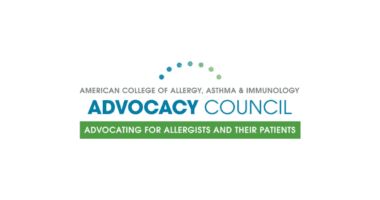ACAAI’s Advocacy Council has been fighting hard to ensure the voices of allergists are heard in Washington, DC. With a new incoming presidential administration and Congress, the new year will certainly see plenty of activity on issues that directly impact allergy practices and our patients.
In a year that will be defined by change, this document will serve to ground our advocacy priorities for 2025. As always, the Advocacy Council remains flexible to address other issues that arise throughout the year.
Medicare reimbursement
Fixing how Medicare pays physicians continues to be the Advocacy Council’s top priority. Inflation has outpaced updates to the Medicare Physician Fee Schedule (PFS) Conversion Factor (CF) by more than 20% since 2010. Physicians and other health care professionals also face more reimbursement reductions unless Congress acts to prevent those cuts from taking effect. There are various bills in Congress that seek to provide relief. One bill would make changes to how the PFS makes budget neutrality adjustments. Others would directly offset reductions to the 2025 PFS CF. Most notably, one bill would provide an annual inflationary update to PFS adjustments. The College has endorsed all of these measures and will continue to urge Congress to pass legislation that fixes our broken Medicare reimbursement policies.
Payer Education Campaign
The College recently launched the Payer Education Campaign (PEC) that focuses on claims for allergen immunotherapy services. For too long, insurance companies have implemented ridiculous and burdensome requirements for allergists to be paid for the disease-altering service we offer our patients. The paper, Guidance for the evaluation by payors of claims submitted using Current Procedural Terminology codes 95165, 95115 and 95117 – Annals of Allergy, Asthma & Immunology, a project of the three allergy societies (ACAAI, AAAAI and AAOA), was recently published as an initial step. Building on that paper, we have begun educating the insurance companies through the PEC.
Advocacy Council leaders are meeting with individual carriers one at a time to educate them on the immunotherapy process and asking them to change their coverage policies accordingly. This is a time-consuming process to which leaders are committed. Watch for updates in the Advocacy Insider newsletter.
Prior authorization and step therapy
Patients continue to experience care disruptions and denials due to overburdensome prior authorization and step therapy requirements. Medical practices must dedicate staff and financial resources to comply with these often unnecessary administrative requirements. CMS has taken some regulatory action on prior authorization for federally regulated health plans, but more work must be done at both the federal and state levels. The Advocacy Council will continue to push Congress to pass more comprehensive restrictions on how health plans can use prior authorization and step therapy.
EFT fees and virtual credit cards
For years, allergists have faced unfair payment cuts from virtual credit card (VCC) fees and from third-party payment vendors charging similar fees for standardized electronic funds transfers (EFTs). The fees for these payments add to the many financial burdens allergists already face. A bipartisan group of legislators – motivated in part by a ProPublica article –introduced legislation that would prohibit third-party vendors from charging EFT fees. The Advocacy Council supports this bill and will also urge Congress to introduce legislation that addresses VCCs.
Medicare Advantage
Medicare Advantage (MA), which now covers more than half of all Medicare beneficiaries, continues to increase burdens on medical practices and disrupt patient care with inaccurate networks and overburdensome prior authorization requirements. The Advocacy Council has supported legislation that would help address some of these issues, but more work needs to be done. Improving Medicare Advantage will be a top advocacy priority in 2025.
Inhaler access
Many patients face high out-of-pocket costs for their inhalers due to their health insurance coverage’s inadequate benefits. Allergists want to ensure patients have access to affordable medications while also ensuring inhalers remain available on the market. In 2024, Congress and the Administration singled out inhaler prices in a variety of ways. The Advocacy Council made itself a resource to Congressional offices to help them better understand the clinical perspective on how their proposals could impact patients and to urge them to balance any affordability policies with the need to maintain continued availability of the products on the market.
This scrutiny has not always resulted in new, tangible policies. Therefore, we expect this effort to continue in the new year.
PBM reform
Pharmacy Benefit Managers (PBMs) have created significant obstacles for patients accessing lifesaving inhalers and other medications allergists prescribe. Prior authorization and step therapy are overutilized and can delay and disrupt care for patients. When GSK withdrew Flovent from the US market, PBMs failed to include the generic alternative in many of their formularies, making this drug inaccessible for the countless Americans who depended on it to manage their asthma. The Advocacy Council heavily supports congressional efforts to increase transparency and rein in PBMs’ spread-pricing practices that make essential drugs both expensive and inaccessible for asthma patients.
Value-based care
While payers increasingly encourage physicians to move to value-based payment models at an increasing rate, it is essential that the Advocacy Council use its platform to raise awareness about the administrative burdens associated with some of these models. For Medicare, participation in value-based payment models, such as the Merit-based Incentive Payment System (MIPS), is the only way for many specialty physician practices to earn meaningful positive payment adjustments. Further, new MIPS Value Pathways do not provide adequate reporting options for allergists. Allergists need new value-based payment models that make sense for our specialty and should not have to rely on flawed programs as the only opportunity for increased payments. The Advocacy Council will continue to advocate for improvements to value-based payment programs to make them more workable and less burdensome for allergy practices.
Research funding
The Advocacy Council will continue to support Congressional funding for allergies, asthma and other immunologic conditions. Congress could attempt to restructure and reform the National Institutes of Health (NIH) in the new Congress. It is essential that the Advocacy Council is involved in these efforts to protect federal research funding for the conditions that allergists specialize in treating.
Cybersecurity
The 2024 Change Healthcare cyberattack caused massive disruptions to the health care sector and specifically allergy practices. In response to this and other cyberattacks, Congress and HHS are exploring ways to improve cybersecurity throughout the health care sector. While the Advocacy Council agrees with the importance of cybersecurity, we will advocate to ensure any new cybersecurity requirements minimize imposing new financial and administrative burdens on allergy practices.
The Advocacy Council – ADVOCATING FOR ALLERGISTS AND THEIR PATIENTS.




